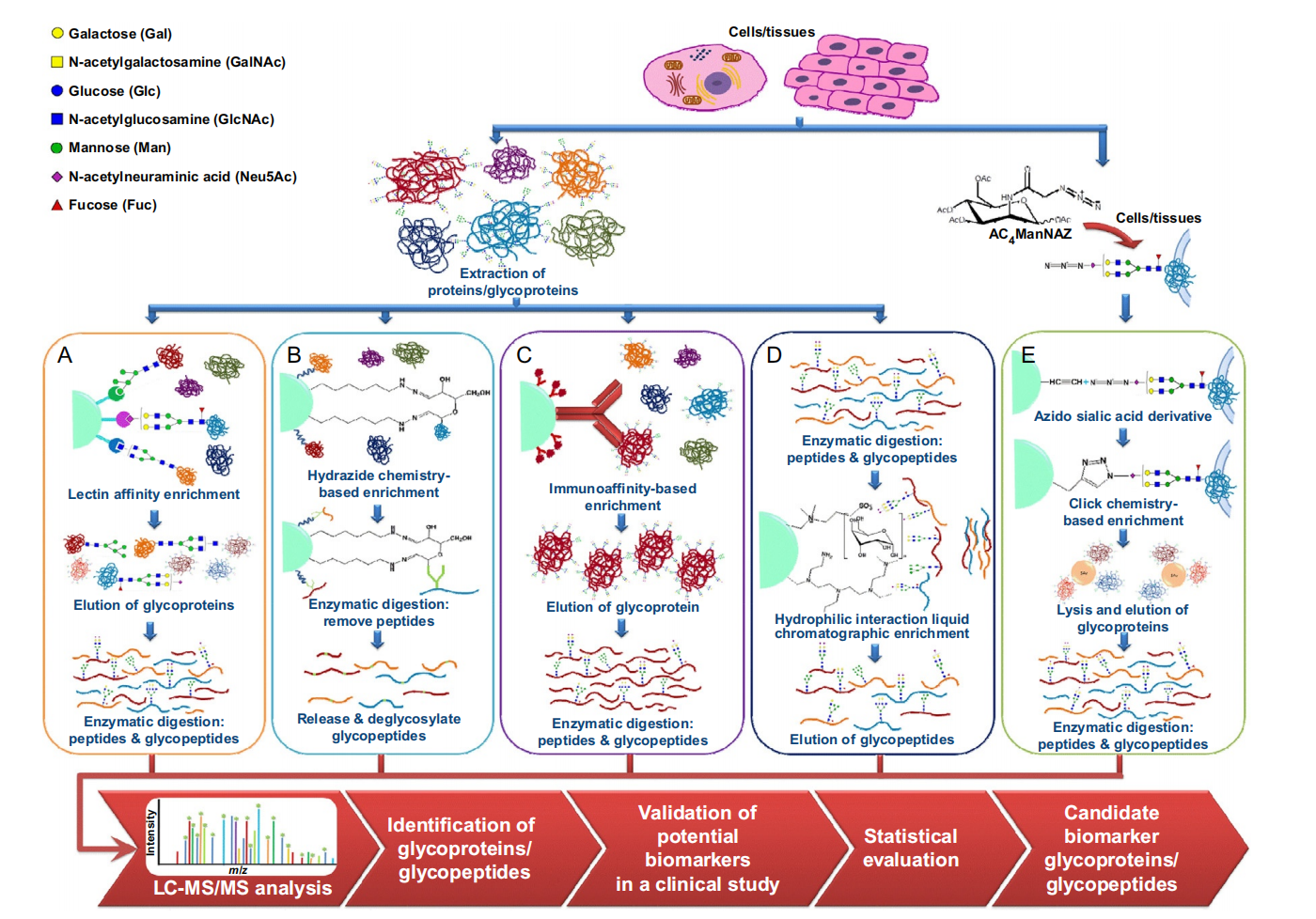Glycoprotein Biomarker Analysis Service
Glycoproteins are proteins covalently modified with carbohydrate (glycan) chains. These modifications are not random but highly regulated, and they play vital roles in protein folding, stability, solubility, and interactions with other biomolecules. Because of this, glycoproteins are often found at the center of biological processes ranging from immune regulation to cell signaling and pathogen recognition. Importantly, alterations in glycosylation patterns are increasingly recognized as hallmarks of disease states, making glycoproteins and their glycan structures powerful sources of biomarkers for clinical research and diagnostics.
Biomarkers derived from glycoproteins provide valuable insights into disease onset, progression, and therapeutic response. For instance, aberrant glycosylation has been linked to cancer metastasis, autoimmune diseases, infectious diseases, and neurodegenerative disorders. Compared to traditional protein biomarkers, glycoprotein biomarkers often offer enhanced sensitivity and specificity because subtle changes in glycan structures can reflect pathophysiological changes at an earlier stage.
Glycoprotein biomarker analysis, however, is technically challenging. Glycoproteins are structurally heterogeneous, carrying multiple glycoforms at different sites. They are often present in low abundance within complex biological matrices such as serum, plasma, urine, and cerebrospinal fluid. Furthermore, their structural stability can be influenced by environmental conditions, adding another layer of complexity. Overcoming these challenges requires advanced separation, enrichment, and mass spectrometry-based analysis strategies supported by robust bioinformatics tools.
Service at MtoZ Biolabs
MtoZ Biolabs offers a comprehensive Glycoprotein Biomarker Analysis Service. Our Glycoprotein Biomarker Analysis Service platform integrates cutting-edge technologies and optimized workflows to deliver high-quality data for glycoprotein biomarker discovery, validation, and clinical translation.
Our Glycoprotein Biomarker Analysis Service includes:
🔸Glycoprotein Separation and Enrichment
Using lectin affinity chromatography, hydrazide-based glycoprotein capture, and hydrophilic interaction liquid chromatography (HILIC)–based enrichment, we selectively enrich glycoproteins or glycopeptides from complex biological samples. This step reduces background interference and improves the detection sensitivity of potential biomarkers.
Through LC-MS/MS and complementary proteomics techniques, we identify glycoproteins and their site-specific modifications with high accuracy, linking glycan structures to specific proteins.
🔸Glycan Analysis and Quantification
Detailed profiling of glycan structures, including monosaccharide composition, branching patterns, and linkage types. Quantitative workflows allow us to determine relative and absolute glycan abundances, providing insights into disease-associated glycosylation changes.
🔸N-Linked and O-Linked Glycosylation Analysis
Characterization of both N-linked and O-linked glycosylation sites, revealing site occupancy, structural heterogeneity, and functional implications of glycosylation modifications.
Analysis Workflow

Zhu, R. et al. Methods Enzymol. 2017.
Figure 1. Workflow for Glycoprotein Biomarker Analysis Service
Why Choose MtoZ Biolabs?
☑️Advanced Analysis Platform: MtoZ Biolabs established an advanced Glycoprotein Biomarker Analysis Service platform, guaranteeing reliable, fast, and highly accurate analysis service.
☑️Proven Expertise: A dedicated team of scientists with deep experience in glycoprotein chemistry and proteomics.
☑️Comprehensive Solutions: End-to-end services covering separation, enrichment, structural characterization, quantification, and validation.
☑️Customizable Workflows: Flexible approaches tailored to the needs of discovery research, translational studies, and regulatory submissions.
☑️High-Data-Quality: Deep data coverage with strict data quality control. AI-powered bioinformatics platform integrates all glycoprotein biomarker analysis data, providing clients with a comprehensive data report.
☑️Client-Centered Service: Personalized project design, transparent communication, and timely delivery to support diverse research objectives.
☑️One-Time-Charge: Our pricing is transparent, no hidden fees or additional costs.
Applications
1. Medical Research
Glycoprotein biomarker analysis enables researchers to investigate how changes in glycosylation are linked to disease mechanisms. This supports studies of cancer metastasis, autoimmune disorders, neurodegeneration, and infectious diseases by providing site-specific and structural glycoprotein data.
2. Clinical Diagnostics
Aberrant glycosylation patterns serve as sensitive and specific disease markers. By identifying and quantifying glycoprotein biomarkers in serum, plasma, urine, or cerebrospinal fluid, our service facilitates early diagnosis, patient stratification, and monitoring of therapeutic responses.
3. Biopharmaceutical Development
Glycosylation is a critical quality attribute in therapeutic proteins such as monoclonal antibodies and Fc-fusion drugs. Glycoprotein biomarker analysis helps manufacturers ensure batch consistency, improve safety and efficacy, and generate regulatory-compliant datasets for quality control.
4. Biomarker Discovery and Validation
Our service supports the discovery of novel glycoprotein biomarkers by comparing patient cohorts, disease stages, or treatment groups. This accelerates validation studies and strengthens translational research pipelines.
Sample Submission Suggestions

All samples should be kept on ice during processing, and stored at –80°C prior to shipment. Ship samples on dry ice with proper labeling and accompanying documentation.
If you have special sample types or require additional guidance, please contact us for personalized support before sample preparation.
Deliverables
1. Comprehensive Experimental Details
2. Materials, Instruments, and Methods
3. Total Ion Chromatogram & Quality Control Assessment (project-dependent)
4. Data Analysis, Preprocessing, and Estimation (project-dependent)
5. Bioinformatics Analysis
6. Raw Data Files
Related Services
Glycoprotein Profiling Service
Intact Glycoproteins Analysis Service
Glycoprotein Amino Acid Sequence Analysis Service
How to order?







